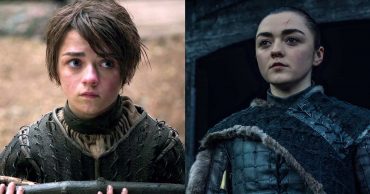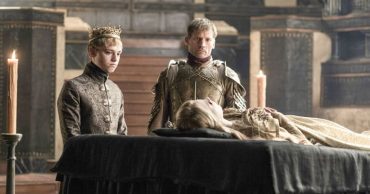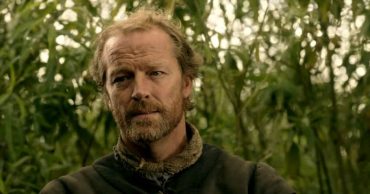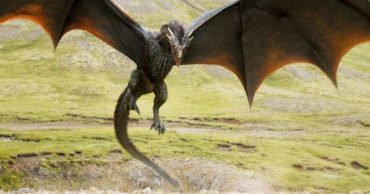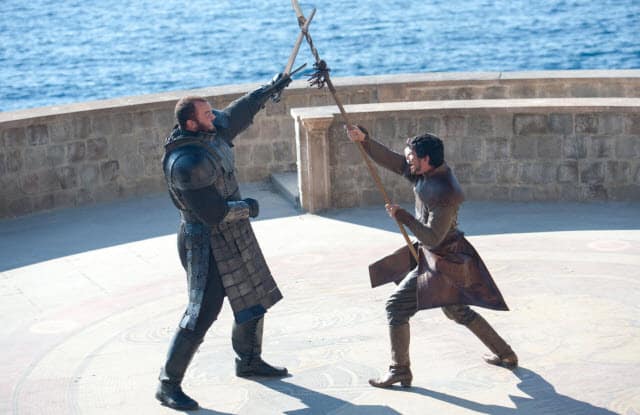
Motivation is a very tricky thing: don’t display enough of it in Westeros, and a creature more passionate than you will most likely come along and claim your life. By the same token, allowing yourself to be consumed by one singular purpose proves to be just as unhealthy, suffocating oneself until they’ve lost their identity, their head, or both. “The Mountain and the Viper”, highlighted by its titular battle scene at the conclusion, is an hour of small movements, self-contained scenes about the things that drove certain characters and/or what makes them tick now, whether they’re on the brink of death (like Tyrion), or simply trying to avoid the same fate as others (Sansa).
The most obvious of these comes with Jorah, whose spying way back in season one (remember the poison wine?) for Varys is finally revealed when Robert’s letter of pardon finally reaches Meereen: since he’s rededicated his life to her, his earliest betrayals have gone unmentioned by characters, a forgotten little plot thread that drops like a ton of bricks when Barristan delivers the news to Dany and her council. Jorah’s slow journey from traitor to trusted confidant’s been a long one (one that began before the series itself), and watching it all crumble in a matter of minutes set the stage wonderfully for the brutality to follow in King’s Landing. It’s very hard to escape one’s past in Westeros – and although sometimes characters like to create new personas for themselves (like the Stark sisters), it’s only a matter of time before that facade falls away, and the things we really want become clear (Jorah’s declarations of love being a great example of this).
Next to the closing scene, Jorah’s fate might be the biggest shock of the episode, a plot point that seems distinctly placed in the episode to remind characters that the horrors they run from (or in the case of Oberyn, the ones they chase around the world of Westeros) are often reflections of who they are – or in Jorah’s case, who they once were (a man seeking forgiveness from the Capitol in any form possible, even as a spy to the Spider). There are moments when these connecting narrative threads feel a bit thin: Ramsey Snow becoming a Bolton can only mean more horrible things for Theon as Roose claims himself as Warden of the North, using Reek’s old identity as Theon to fool the remaining soldiers loyal to his father, to their deaths 300 or so miles away from home. Great news? We still don’t understand a ton about Roose except his penchant for causing widespread chaos throughout the world: what does he stand to gain by attacking the Capitol? Sure, the North is larger than all other six regions of Westeros combined: but does he have a chance, even against a weak and distracted King’s Landing?
Theon and Ramsay’s scenes aren’t necessarily bad: but in an episode that moves the plot forward further than any episode since The Purple Wedding, there isn’t a lot of agency to these character’s actions. Reek acts as he is told, for the sake of making his master happy; Ramsay and Roose’s relationship is a typical father/bastard son one in Westeros, the only twist in the fact Roose actually names his bastard son Bolton, for the sake of protecting his land (had Ned taken the same stance with Jon, would Westeros lie in ruins right now? There’s certainly a debate to be had). There’s stuff happening, sure, but compared to the other, more emotionally engaging story lines, the continued mental torture of Reek/Theon ranks near the bottom of Game of Thrones‘ many, many interwoven narratives.
Of course, as soon as the attention shifts to King’s Landing, “The Mountain and the Viper” begins to deliver on its hype: catalyzed of course, by Tyrion’s speech to Jaime about their cousin, a simpleton who smashed beetles all day long, for seemingly no reason. As the last hours of his life sit in front of him, all Tyrion can think about is what drove a man to kill bugs, smashing them with gusto, and never acknowledging the death it brought around him. After all, killing those beetles is what this particular Lannister felt like doing: we may not know why he was compelled, but compelled he was to kill over and over again, silently motivated by what we can assume is a mix of instinct and mental simplicity – a combination that not only parallels to The Mountain, but speaks to the horrors of those whose acts can’t be defined by simple examination of one’s motivations (Tyrion himself has been subject to this all season, his assumed motivations becoming the definition of his character, despite the self-preserving truth his actions always convey).
It all culminates in the episode’s titular fight, which some might say suffers a bit from just how long the episode draws out the fight. However, I’d argue the dramatic build-up (which included a convenient week off the air for Memorial Day) makes the scene that much more effective, a short-lived match with a brutal ending, a reminder that showmanship and divine retribution only get one so far in this world. Consumed by his passion, Oberyn couldn’t contain himself when he finally had the attention of the crowd, toying with a wounded Mountain to admit the orders to rape and kill his sister and nieces was approved by Tywin himself.
Ahh, the things that drive us can so often be the things that destroy us: and “The Mountain and the Viper” ends on just that note, Tyrion being sentenced to death by his father, while the smashed skull of Oberyn lies on the dueling stage. It’s another little wonderful mini-play on morality in Westeros: the beetle-smashers in this equation (Tywin and his human rock Sandor) win out, their power smashing the Martell’s greatest warrior like a bug, a stain on the steps of King’s Landing and nothing more, as Tywin rises once again in victory (a smiling Cersei in tow). Lest we forget, Westeros is an unforgiving world, one where brutality always outweighs showmanship, and one’s guilt is placed in the hands of two combatants (any by proxy, the gods) when the court turns its back. There’s still some debate whether words or actions are more powerful in this world (though this fight definitively sits on the side of the latter), but one thing is clear: in the end, the things that motivates them all is death: death of self (more on that in the notes below, re: Sansa), death of family, or perceived death of honor.
Other thoughts/observations:
– Sansa finally grows up! Not only does she save Littlefinger’s life in front of the Vale council, but she dies her hair to remind Littlefinger just why he does what he does… he always said she looked like a young Catelyn, what must he think now with her black hair and newfound cleverness?
– As soon as a character promises to return to someone/someplace, they usually die. Oberyn clearly missed this memo.
– next week looks to be a Wall-heavy episode, as Mance Raider and his army arrive in the town Sam recently placed Gilly in (she lives, thanks to Ygritte’s random show of kindness towards a stranger and her baby). Castle Black is being protected by 105 (wait, make that 102) soldiers: with 100,000 Raiders on their way, things are about to get real, real ugly for the Night’s Watch.
– Grey Worm has developed a crush on Missandei – this can’t be a good sign for Dany, even if Grey Worm is missing the pillar and his stones.
[Photo via HBO]
 Follow Us
Follow Us


